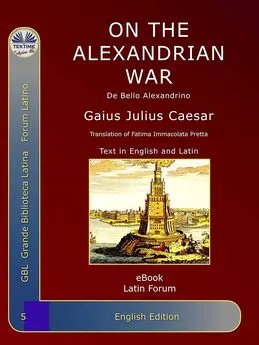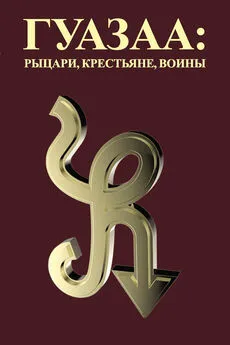Caesar Gaius - On The Alexandrian War
- Название:On The Alexandrian War
- Автор:
- Жанр:
- Издательство:неизвестно
- Год:неизвестен
- ISBN:нет данных
- Рейтинг:
- Избранное:Добавить в избранное
-
Отзывы:
-
Ваша оценка:
Caesar Gaius - On The Alexandrian War краткое содержание
On The Alexandrian War - читать онлайн бесплатно ознакомительный отрывок
Интервал:
Закладка:
An interesting aspect is the disdain for the killing of Pompeo and the macabre gift received by the young Pharaoh. Caesar's outrage seems sincere and I think it can be considered a just reaction if we consider that in those days Rome was not so great and that the two were fellow citizens, friends, party companions and even relatives. Then perhaps Caesar did not want the death of a man dear to his fellow citizens who had however made his homeland great, in short, strangers did not have to put their beak in strictly Capitoline affairs.
In any case, for Caesar, the Alexandria war was not easy, he often found himself in difficulty and the pages that describe it are therefore very interesting because they show us how the Romans had reached a much higher strategic level than older but also plastered peoples in habits not suitable to face the tough veterans framed in the legions reformed by Gaius Mario years before.
In a certain way, one realizes that republican practice, with its rules, allowed politicians to compete with each other without annihilating themselves, thus bringing out the qualities of individuals, who were thus also spurred on to competition but each in their own sphere , as a team with many capable players.
After the Egyptian phase there is a small pontic part in which Rome's difficulty in defending the eastern provinces with the defeat of Domizio Calvino is narrated.
Then the text moves to Illyria telling us about the difficult situation of that province after the battle of Farsalo, where the Pompeian fleet commanded by Marco Ottavio and the remains of his army, create quite a few problems for the Cesarian governor of the province who must be rescued by well two contingents.
The fourth part of the book moves to Spain and tells us a very intricate story concerning that province where two Cesarian factions confront each other causing serious damage to their political leader.
The last part is almost triumphant for Caesar that from Egypt, through Syria arrives in Asia and then in that pontic province oppressed by an arrogant king named Farnace who already boasted of his conquests, but whom Caesar defeats in one battle and rather quickly, so much so that when writing to a friend, these words will come: "I came, I saw, I won".
ON tHE ALEXANDRIAN WAR
De Bello Alexandrino
Text in English
Prologue
De Bello Civili third book
102.
Caesar felt he had to leave out everything else and devote himself to chasing Pompeo to prevent him from gathering a new army and resuming hostilities. Every day he chased Pompeo advancing as much as he could with the cavalry but he had also ordered a legion to follow him even if with shorter stages. In Amphipolis an edict was issued in the name of Pompeo asking all young people in the province, whether they were Greeks or Roman citizens, to gather to swear military loyalty. It was not possible to understand whether this was done to divert attention from the true path of his escape or to try to maintain control of Macedonia in case the Cesarians did not attack that province. Pompeo stayed at anchor in Amphipolis one night, in which he summoned with him acquaintances and other guests to whom he asked for money on loan for the necessary expenses, therefore, having learned of the imminent arrival of Caesar, he left that place arriving in Mytilene a few days later. There he was detained for two days by bad weather; he used that time to add lighter ships to his ships, then left for Cilicia and from there reached Cyprus. In Cyprus he learned that the city of Antioch, with the consent of all the inhabitants and the Roman citizens who had their commercial activities there, had set up armed garrisons to prevent him from entering the city, and had sent ambassadors to the regions near there to also order other fugitives who were unwelcome in Antioch, and who had dared to do so, would have done so at the risk of life. A similar thing happened also to Lucio Cornelio Lentulo Crure in Rhodes, even if the year before he had covered the Consulate, to another former Consul like Publio Cornelio Lentulo Spintere and others. These had followed Pompeo in the escape; when they arrived on the island, they were not welcomed either in the city of Rhodes or in the port; indeed, shortly afterwards he was notified of the order to move away from those places and unwillingly, they took off. This was because the news of Caesar's arrival that was in pursuit of Pompeo was spreading everywhere.
103.
Having become aware of these facts, Pompeo abandoned the plan to reach Syria, after which he demanded money from the tax contractors, and received more on loan from private citizens; he loaded a large quantity of military bronze on his ships, armed 2000 men chosen from among the servants of the contractors or with servants found by the merchants of those they deemed suitable for the war and went to Pelusio. In Pelusio the Egyptian king Ptolemy XIII (13) was found by pure chance with an imposing army, who was engaged in fighting against his sister Cleopatra who a few months earlier had driven away from the throne, instigated by friends and relatives. Cleopatra's camp was not far from that of Ptolemy, but Pompeo chose to send Ptolemy bound with the request to welcome and protect him by virtue of hospitality and his friendship with his father. But these ambassadors, after having fulfilled their mission, began to speak indiscriminately with the soldiers in the service of Pharaoh, urging them to lend their help to Pompeo because among these there were many who had previously served under him and whom Aulo Gabinio had subsequently accepted among the ranks of his army in Syria and from there led to Alexandria at the time of Ptolemy XII (12) father of the boy king; these, once that war was over, Aulus Gabinius left free to remain with Ptolemy XII (12).
104.
This alarmed the advisers of the young pharaoh who, precisely because of his young age, actually ruled the kingdom, fearing that Pompeo could take control of the army and occupy Alexandria and Egypt, but also despising the current state of disgrace and the fate of Pompeo. They responded to his messengers with apparent courtesy, inviting him to present himself confidently to the king, showing himself falsely friends, as often happens in misfortune when friends become treacherous enemies. The Egyptians held a secret council in which they chose how to act, then sent Achilla, a man of singular audacity, with Lucius Septimius, a military tribune who had some confidence with Pompeo since during the war against pirates he had led a department of his army ; they, treating him with courtesy, invited him to board with a few companions on a small ship where he was killed by Achilla and Lucius Septimius. The same fate happened with Lucio Cornelio Lentulo Crure, who was first captured by order of the king and then killed in prison.
105.
Caesar, arriving in Asia, discovered that Tito Ampio had tried once again to take away the treasure of the Temple of Diana in Ephesus, so much so that he had called to assist all the Senators of the province to witness the amount of money withdrawn, but warned of the impending arrival or Caesar fled leaving everything in its place. Curiously, it was the second time that Caesar unwittingly saved the treasure of the Temple of Ephesus ... Another extraordinary event occurred in the Temple of Minerva in Elis; making the necessary calculations, it was understood that, on the same day in which Caesar won in Thessaly, a statue of Victory placed in that temple in front of that of Minerva and turned to it, turned towards the doors of the temple threshold. On that same day there was also an extraordinary event in Antioch in Syria: two times there was the outcry of an army and the sound of trumpets so loud as to make citizens flock to the walls with weapons ready from everywhere. The same thing happened in Tolemaide, while in Pergamum, in the most secret rooms of temples where access is allowed only to priests and which the Greeks use to call Adyta, the eardrums rang. Also in Tralli, in the temple dedicated to Victory where a statue of Caesar had been consecrated, a palm was shown that had sprung up between the joints of the stones.
106.
Caesar stayed only a few days in Asia; having leaoned that Pompey had been sighted in Cyprus, speculating on the possible final destination of Pompeo and considering that he was going to Egypt, a kingdom with which he had relations of some importance and the many comforts he offered, with a legion to which he had ordered already in Thessaly to follow him and a second conducted by the lieutenant Quinto Fufio Caleno left from Achaia and with 800 knights, escorted by 10 warships of Rhodes and few others from Asia, he arrived in Alexandria in Egypt. These legions were made up of 3200 men as many were injured in battle or fatigued from the long journey, so many were unable to follow him. But Caesar did not worry much about this, trusting in the fame obtained with his victory that made every place safe for him. But when he landed in Alexandria he realized that the soldiers left in the city by the king as a garrison were shouting at him and that even the population showed hostility towards him and that this was caused by the bundles that preceded him. The problem was that this was considered lese majesty towards their pharaoh. Once this misunderstanding was quelled, the problems did not end because in the following days there were many seditious gatherings and many soldiers were killed on the streets in various parts of the city.
107.
Considering the situation quite dangerous, he ordered that other legions from Asia be sent to him, units that he himself had set up to be formed with the veterans of the Pompeian legions. Besides, he was forced into Alexandria by those winds called Etesii that prevented him from sailing from his port. But in addition to the weather hindrances, Caesar believed it was pertaining to the Roman people and his as consul, to resolve the dispute between Ptolemy XIII (13) and his sister, also in consideration of the fact that during his previous consulate he had proposed a law, then which became a Senate Decree, which entered into an alliance with Ptolemy XII (12) father of the current pharaoh. He then let the Egyptians know that it would be to his liking that Ptolemy XIII (13) and Cleopatra would dissolve their respective armies and settle their disputes before him, following the legal and not the arms routes.
108.
But due to the young age of the boy pharaoh, one of his eunuch pedagogues named Potinus was in fact the ruler of the Kingdom. The eunuch at first complained to his helpers, he was indignant that a king was called to defend himself in court. Subsequently, following his complaints, he found among the collaborators of the king who could help him implement his plans; thus he managed to secretly bring the army from Pelusio to Alexandria and put in charge the Achilla already mentioned. Achilla was instigated and made proud by promises of both Potino and the king; through letters to ambassadors, Potino made him aware of his plans.
In the testament of Ptolemy XII (12) the eldest of the two sons and the eldest of the two daughters were indicated as heirs. Still in the same testament, in the name of the Gods and of the alliance made with Rome, Ptolemy XII (12) called the Roman people to be witness and guarantor of its dispositions. A copy of this testament had been sent to Rome to be kept in the public treasury archive; this copy, however, could not be deposited due to the ongoing political upheavals and remained among Pompeo's documents; the other copy was kept in Alexandria and was published with the royal seal.
109.
While Caesar was busy acting as arbiter to settle the matter by acting as a friend of both and the various issues were dealt with before him, the sudden news came that the royal army with all the cavalry was heading towards Alexandria. The soldiers at Caesar's disposal were not such as to be able to face a battle outside the city, so he could not help but remain on his positions in the city and understand what Achilla's intentions were. Caesar ordered his men to remain in arms and asked the king to send ambassadors to Achilla choosing among his family those who had a greater prestige, so that he could ask him what he intended. The king chose Dioscorides and Serapion, former ambassadors to Rome and known for their great authority over Ptolemy XII (12). When they arrived at Achilla's camp they didn't even have the opportunity to explain the reason for their embassy, because Achilla ordered them to be captured and killed. So they were immediately taken, one killed, the other wounded was thrown away as if he were dead. Following this event, Caesar considered it more convenient for him to keep the king in his power, considering the ascendancy that he had over his subjects but also to make it appear that the war was not waged out of royal will, but only because of initiative of private citizens and unscrupulous adventurers.
Читать дальшеИнтервал:
Закладка:






![Джеймс Купер - Зверобой, или Первая тропа войны [The Deerslayer, or The First Warpath]](/books/1068494/dzhejms-kuper-zveroboj-ili-pervaya-tropa-vojny-the.webp)


